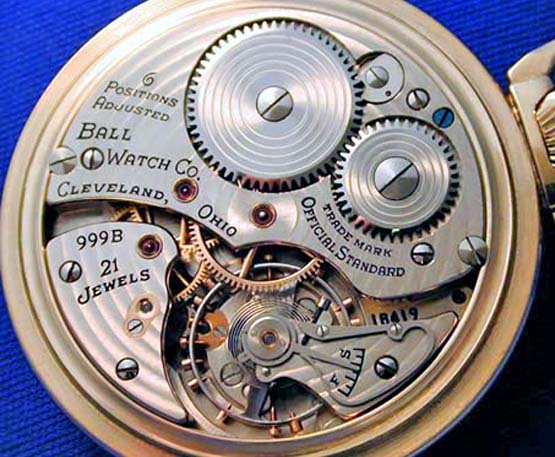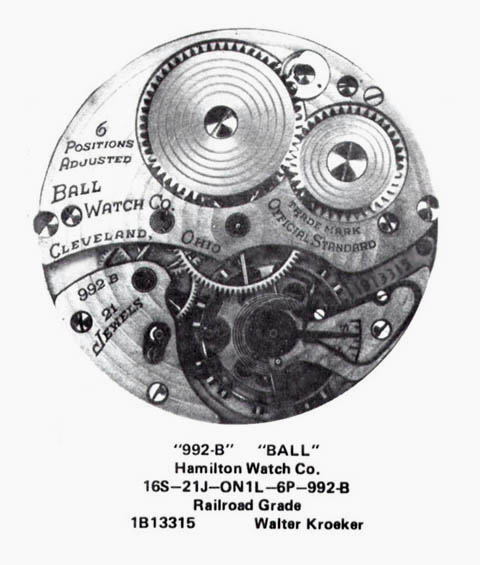
| WWT Shows | CLICK TO: Join and Support Internet Horology Club 185™ | IHC185™ Forums |

|
• Check Out Our... • • TWO Book Offer! • |
Welcome Aboard IHC185™  Internet Horology Club 185
Internet Horology Club 185  IHC185™ Discussion Site Main Page
IHC185™ Discussion Site Main Page  Open to the World RESEARCH FORUMS
Open to the World RESEARCH FORUMS  Ball Watch Company Research Forum
Ball Watch Company Research Forum  Ball Hamilton 999B Models, 21and 23jewel Question - Basic 999B History and More!
Ball Hamilton 999B Models, 21and 23jewel Question - Basic 999B History and More!
 Internet Horology Club 185
Internet Horology Club 185  IHC185™ Discussion Site Main Page
IHC185™ Discussion Site Main Page  Open to the World RESEARCH FORUMS
Open to the World RESEARCH FORUMS  Ball Watch Company Research Forum
Ball Watch Company Research Forum  Ball Hamilton 999B Models, 21and 23jewel Question - Basic 999B History and More!
Ball Hamilton 999B Models, 21and 23jewel Question - Basic 999B History and More!Go  | New Topic  | Find-Or-Search  | Notify  | Tools  | Reply to Post  |  |
| IHC Member 935 |
Ball Hamilton 999B Models, were there both 21j and 23j produced? Between the 21j and 23j models, is one to be prefered over the other? I want to start a search for the prefered model and one that is in very good condition. What should be my search strategy? Thanks! | ||
|
| IHC President Life Member |
(POST 1 of 4) Mort, The easy answer to your question is the 16-size 21-Jewel because even though there are references to it, the 23-Jewel 999B, planned as the "998B" did not actually reach production. But a history of the Ball 999B is a bit more complicated than that, we explore these watches, how they came to be and some information you and others may find of use in these 4 postings. Introduced in October of 1940 the Hamilton 992B was remarkable achievement, the most successful Railroad Watch ever made and the Ball 999B which was launched in 1943 shares the same basic plate layout and internal components. After phasing out both the earlier Ball-Hamilton 999 and their remarkable 998-Elinvar they had planned to produce a new 23-Jewel version, the 998B and according to Hamilton records there were 1,000 numbers set aside for them. However, the war intervened, demand was very high and those numbers 2B001 through 2B1000 were oddly re-assigned to other movements. The lower ones 2B001 through 2B700 were actually used for the first 700 of the 21-Jewel 999B movements which were part of 1943 production. Then 2B701 through 2B1000 were assigned for Hamilton 950B movements in 1943 production. There is a report of 950B number 2B1000 being finished on December 3, 1943 according to Hamilton records, whether that is entirely correct or not still remains to be seen. Variant 1 example: 2B188 which was among the earliest produced... | |||
|
| IHC President Life Member |
(POST 2 OF 4) Now, as you see, the earliest 999B movements which were 2B001 through 2B700 would be worthwhile to consider for your collection. Although they are otherwise identical to very earliest 1B-prefix movements these 2B-prefix numbers provide discerning collectors with an interesting and very uncommon first variation. All the 999B movements beginning at 1B001 through at least 1B26879 movements have the familiar circular damaskeening we tend to associate with Ball Watches. The style of winding wheels and screws changed over the years, they phased out both the Gold Center Wheel by about 1B1300 in 1945 and Gold Jewel Settings shortly thereafter, but the basic design remained unchanged. With the Elinvar-extra hairsprings which are resistant to magnetic fields and many other advancements over earlier models the 999B is a favorite among collectors today. Check this topic: "Ball-Hamilton 999B ... Gold Center Wheels?" for additional reserach on these movements. Variant 2 example: 1B419 featuring 999B circular demaskeening...  | |||
|
| IHC President Life Member |
(POST 3 OF 4) We should also mention the one presumably factory error "Ball 992B" number 1B13315 which has an obviously mis-marked as "992B" plate on it. That one from 1948 production likely represents the bleary-eyed "Monday-Morning-Messup" or "factory-freak" kind of thing that happened at times in factories. Seems like it got by the final inspection that day and for the sake of curiosity appears on page 76 of the "1980 Price Indicator" by Roy Ehrhardt as you see shown below. IMPORTANT NOTE: Assuming this watch to be a genuine factory error it is likely the only "Ball 992B" as no such watch was ever known to be intentionally produced at the factory and it would not make sense from a marketing standpoint to produce such a thing. To think that Hamilton would have permitted their carefully guarded "992" Grade Marking to be intentionally sold on any other make of watch is laughable. I tried to trace down Walter Kroeker but found he was long-deceased, left no surviving family members and the fate of his watch collection is unknown. One more point, be careful, because unscrupulous tricksters have been known to put unrelated 992B and 999B plates together in order to deceive and a few fraudulent examples have been sighted. "Odd-Ball" mis-marked 999B movement...  | |||
|
| IHC President Life Member |
(POST 4 OF 4) These watches sold well in the post-war years and by the early 1950s we find melamine dials were phased into use. The folks at Hamilton stopped keeping records in 1954 and for many years it was assumed that Ball 999B production stopped at that time around number 1B27000 but in reality that was not to be the end. Because then, as if to throw in yet another complication for the last American-Made Ball Watches it turned out the final few hundred 999B movements were actually quite different in appearance from predecessors. For some reason they used the straight-line damaskeening associated with 992B movements on the last ones which we place as being from 1955 production. These very late movements, with their straight-line rather than circular damaskeening show up numbered from at least 1B27117 through 1B27582 and as additional numbers surface we will have a better indication of how many were made. My estimate is that something like 700 of this striking variant were produced. So, there are a few facts about the Ball 999B and how it evolved that I hope you and others might find interesting. We also have a "16-size Ball-Hamilton 999 and 999B Movement Numbers and Years Listing" for your information. As to which 999B variant you might want to collect, some of us tend to think we must have one of each. Lindell IMPORTANT UPDATE!!! All three variants are described in the watch guide beginning with the 2012 edition. The three basic 999B Variants are shown on page 153 of the "Complete Guide to Watches" 2012 Edition. Variant 3 example: Compare lined pattern 1B27472 to earlier examples... .jpg) | |||
|
| IHC Member 935 |
Lin, Thanks for another education! I believe that I will go for any 999B in very good condition that I can find. If you or any other members know of any possible sources, I would certainly appreciate being led to them. Thanks again. | |||
|
| IHC Life Member Wristwatch Host |
Lindell, Thanks for the great info on the 999B and the pictures. I consider the 999B to be a excellent watch. This information will help anyone who is considering adding one to his or her collection. I currently have 4 examples in my collection and would not part with any of them. | |||
|
| IHC Life Member |
Great post, Lindell. I have just one more question. Other than the damaskeening and engravings on the plates, were there any differences between a 999B movement sold by Ball, and a 992B movement sold by Hamilton in any given year? Tom | |||
|
Hi Lin: Great job on the 999B story. I really love this site for its educational benefits that only such a site with so many members can present. It took me some 30 years of collecting to find out about the "different" 999B variations. My most important knowledge was gained from this site. Thanks to you I now have both a "straight line" and a "gold center wheel" in the 999B model line. The 992B fluke is interesting. Several people must not have been "looking" on that "Monday Morning." "Monday, Monday" as the song goes! What would Webb C. Ball think of all this "fuss" over his watches? Does anyone know where that 992B watch is now? Cheers! Joel | ||||
|
You might be interested in these additional facts about the 999B: Production numbers seem to indicate: 1943 993 1944 553 1945 809 1946 1676 1947 3369 1948 3164 1949 3844 total (through 1949) was 14407 There were 361 left in stock at the end of 1949 August 13, 1940 Sales-production conference minutes: "With reference to the production of Grade #999-B and #998-B Ball watches, Mr. Atkinson reported that he had talked to Sidney Ball about this situation and that Mr. Ball approved the use of the solid balance and Elinvar hairspring and asked that the factory be instructed to proceed at once on the new Ball grades." Mar. 27, 1941- Sales-production meeting minutes. "The factory would prefer to us the new hairspring rather than the imported Elinvar spring which was included in the original specification for the new Ball watches." Then in a letter from Hamilton to Sidney Ball dated Nov. 12, 1941, they stated that unless Ball objected, they would use the new white Elinvar Extra hairsprings in the new watches. In a letter from Ball to Mr. Chas. C. Smith (Hamilton VP) dated Nov. 14, 1941, Ball agreed to the use of the new white Elinvar springs instead of blue. "Some of the 'extra wise' watchmakers about the country will probably ask questions and make comments, as they always do when the factory makes any noticeable change; but that will not amount to anything in the long run." Don | ||||
|
| Site Administrator IHC Life Member |
This thread is just another of the wonderful things about IHC 185. And all for just 12 bucks a year. Now I have to find one of those 999B's. | |||
|
Don: Thank you so much for the added information! The Ball story gets more complete with each passing day, thanks to IHC 185! Cheers! Joel | ||||
|
| Powered by Social Strata |
| Your request is being processed... |
|
Welcome Aboard IHC185™  Internet Horology Club 185
Internet Horology Club 185  IHC185™ Discussion Site Main Page
IHC185™ Discussion Site Main Page  Open to the World RESEARCH FORUMS
Open to the World RESEARCH FORUMS  Ball Watch Company Research Forum
Ball Watch Company Research Forum  Ball Hamilton 999B Models, 21and 23jewel Question - Basic 999B History and More!
Ball Hamilton 999B Models, 21and 23jewel Question - Basic 999B History and More!
 Internet Horology Club 185
Internet Horology Club 185  IHC185™ Discussion Site Main Page
IHC185™ Discussion Site Main Page  Open to the World RESEARCH FORUMS
Open to the World RESEARCH FORUMS  Ball Watch Company Research Forum
Ball Watch Company Research Forum  Ball Hamilton 999B Models, 21and 23jewel Question - Basic 999B History and More!
Ball Hamilton 999B Models, 21and 23jewel Question - Basic 999B History and More!©2002-2025 Internet Horology Club 185™ - Lindell V. Riddle President - All Rights Reserved Worldwide

